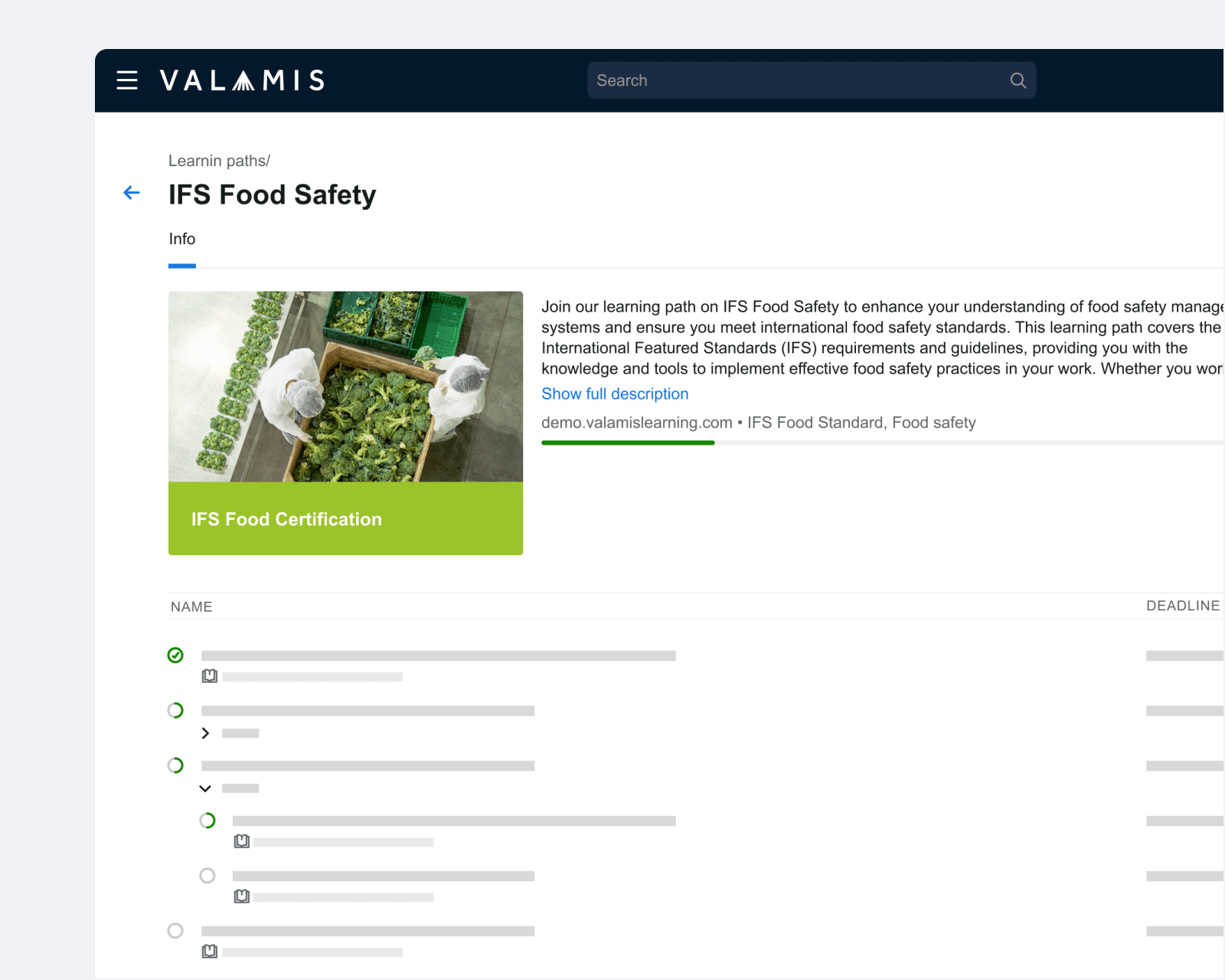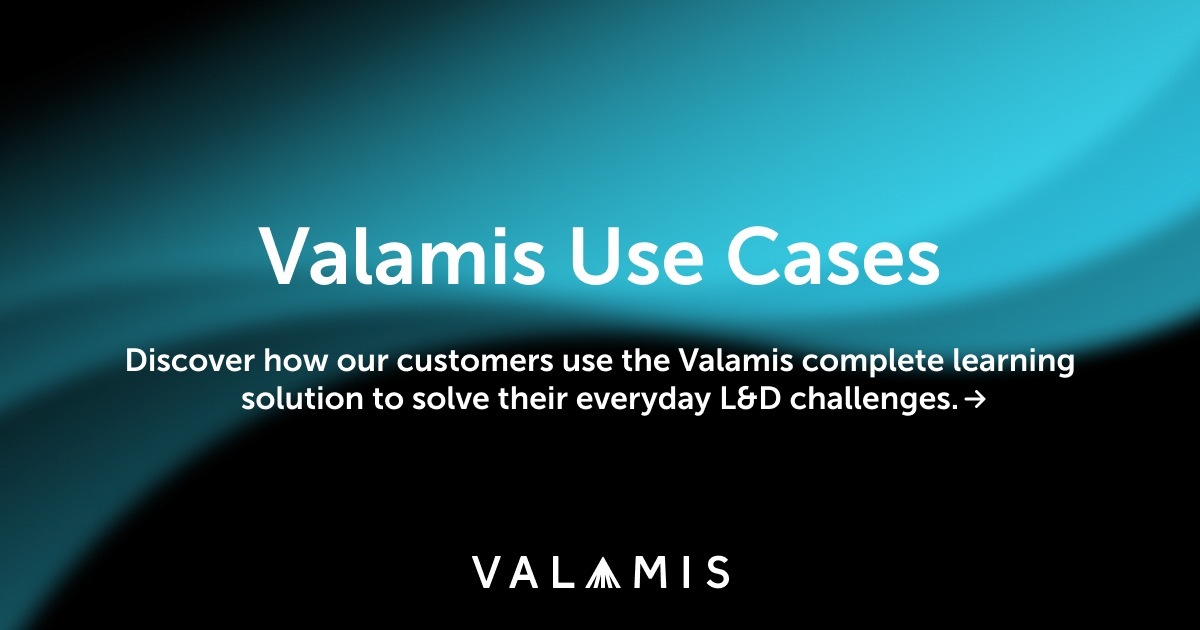Food Safety Compliance: Steps for Employee Growth
With the most recent IFS Food standards recommendations (version 7 & 8) announced there is increased encouragement from the IFS for companies to exhibit and track the growth of their employees by January 2024. It is a valuable opportunity for organisations in the food industry to consider re-strategising and re-aligning their learning and development (L&D) initiatives.
With 2024 fast approaching, let’s explore some solid steps that the food industry can take to demonstrate their commitment to developing the workforce, and how Valamis, as a trusted Learning Management System (LMS) vendor, can assist the sector with this.
Understanding the new requirements
Before charting a course forward, understanding the nuances of the new IFS International Audits requirements is vital. Companies are now mandated to have a robust system in place that not only fosters employee growth but also meticulously tracks this progression. This directive is not just a stride towards fostering a learning culture, but it forms the cornerstone of operational excellence and quality control, especially in the critical food industry.

Steps for successful employee development within the Food Industry
1. Onboarding
Properly onboard and train new employees to ensure they understand their roles, responsibilities, and safety protocols. Training should cover food handling, sanitation, customer service, and any specific skills required for their positions. To get started you can download our popular onboarding checklist here.
Implement mentorship programs where experienced employees can guide and mentor newcomers and support them with skill development. Cross-training employees to gain certification across other roles within the establishment can also be a useful part of onboarding as it not only provides them with a broader skill set but also helps in filling staffing gaps during busy periods. For further reading try our articles: On-the job training, job shadowing and job rotation.
2. Skill Gap Analysis
Undertake a skill gap analysis to identify the competencies that your workforce needs. It’s a pivotal step in understanding what learning programs are essential.
A good place to begin is soft skills training. It’s an often-overlooked addition to technical skills which focus’ on developing employees’ soft skills, including communication, teamwork, problem-solving, and customer service. These skills are essential in the food industry, preparing employees to handle those frequent customer interactions and ensuring that everyday service leaves a positive impression on valued customers. Download our free Skills Gap Analysis guide here.
2. Personalised Learning Paths
Create personalised learning paths for employees to foster continuous growth and learning. It should align with the career goals of the individual and the objectives of the organisation.
For example, many food service organisations would like to offer career development opportunities and pathways for employees, recognising that investing in their growth can lead to higher retention and improved performance. Download our career development plan here.
3. Regular Training Programs
Establish regular training programs that are focused on both soft and technical skills pertinent to the food industry.
New regulations and trends in the way we consume today and in the future have an enormous impact on the food service industry. A good example is sustainability where employee training has now extended to include sustainability practices such as waste reduction, responsible sourcing, and environmentally friendly operations.
4. Performance Monitoring
Implement a system of regular performance monitoring and feedback to ensure the skills acquired are being utilised efficiently on the job.
Conducting regular performance reviews and providing constructive feedback is essential, as is setting clear goals and expectations for employees, and recognising and rewarding outstanding performance. Identify employees with leadership potential and provide leadership development programs. Developing internal talent can lead to more effective management and reduced turnover. Download our free Training Evalutation Form here.
How Valamis Can Support

1. Customisable Learning Paths
Valamis allows the creation of personalised learning paths, helping employees to work on specific competencies, aligning with both the individual’s and organisation’s goals.
Valamis Learning paths use certification and recertification to make validity, expiration dates or annual refreshers easy to manage. Assign compliance training then let the notifications and onscreen reminders prompt learners. Read more about our learning paths here: Learning Paths with Valamis.
2. Analytics and Reporting
Valamis provides powerful tools for tracking employee growth. These tools make it easy to gather data and gain valuable insights, helping you make informed decisions.
The Valamis team have experience in supporting global food service companies and are on hand to guide you into getting the most out of your learning data. Discover more here: Valamis data and reporting suite.
3. Compliance Training
With Valamis, you can stay on top of the necessary compliance training, which is crucial in the food industry to adhere to the safety and quality standards.
Read more about how Valamis can support your food safety compliance training programs here: Use Case for Compliance.
4. Micro and mobile learning
Facilitate microlearning modules that are easier to consume and retain, enhancing the overall learning experience. Valamis learning platforms include a mobile ready learning app as standard meaning all learning and compliance training can be completed on any employee’s mobile device, online or offline. Perfect for the food industry workers who don’t have access to the office or a work computer.
5. Integration with HR Systems
Valamis integrates seamlessly with existing HR systems, making the tracking and reporting of employee growth a hassle-free process.
For further information on what HR integrations we offer please get in touch with us to discuss your needs and requirements.
Conclusion
Employee growth and development are crucial for a skilled and engaged workforce in the food industry. Embrace the new IFS International Audits requirements as an opportunity to revamp L&D strategies. Partner with Valamis to foster a culture of continuous learning and development while ensuring compliance with regulatory mandates. Embrace change and cultivate environments where companies grow with their people. Let Valamis be your trusted partner in this journey toward enhanced learning, growth, and compliance.
Uncover the Power of Valamis!
Explore our use cases, and how Valamis streamlines compliance training, boosts learner engagement, and supports skills management challenges for our valued customers.





